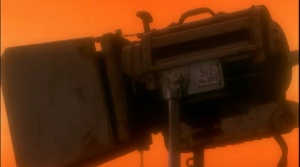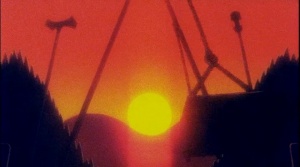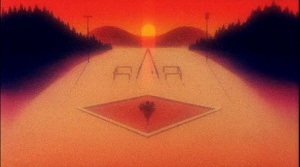Theory and Analysis:Sandbox Sequence
The Sandbox Sequence is a 2 minute 43 second long sequence of scenes from the End of Evangelion that depicts a young Shinji in a playground, specifically in a sandbox. This sequence follows the cut where Yui asks Shinji what he wishes for while he is in the Entry Plug of Evangelion Unit-01. This sequence is filled with symbolism and metaphors and some fans often ask what the purpose of this scene is and what it means. This is one possible interpretation of the events of this sequence.
Summary
Leading up to this sequence, Shinji is in the Entry Plug and is asked what he wishes for. Without giving an answer (here we see a superimposed sketch of a woman's breasts) he starts wavering and turns into LCL. Then the drop of water, which is a visual cue that indicates a shift from the real world to "imaginary world" or vice versa. In this case, we're shifting from the real world (the Entry Plug) to the "imaginary" one (the Sandbox Sequence and following scenes).
At first, we see that everything is grainy, as if we're watching an old movie. As if to further push this motif, we see stage lights and what looks like a movie set.

We see a swing set, swinging back and forth and the music starts, the music is almost carnivalish pipe organ sounding. In the background, we see hills that look very similar to a woman's breasts.

We then see a zoomed out shot of the playground, we can see the swing, the hills, the surrounding trees and the sandbox itself. In the sandbox are Shinji and 2 other children. Here, we hear Shinji narrating, as if he is observing this scene: I see... It's just like when I started the cello. I thought that if I came here, I could find something...

Analysis
It's just like when I started the cello
The only piece of narration we get in the entire sequence is Shinji saying I see... It's just like when I started the cello. I thought that if I came here, I could find something.... This brings us back to what he said about playing the cello in Episode 15
- Asuka: Not bad! I didn't know you played.
Shinji: I've been studying since I was five, and this is all I can do, so I don't really have any talent.
Asuka: Perseverance is power. I'm a little impressed.
Shinji: I started studying because my teacher told me to, so I could have quit anytime.
Asuka: Then why did you keep going?
Shinji: Because nobody told me to stop.
- Asuka: Not bad! I didn't know you played.
This indicates his attitude towards the cello, someone had told him to do it, he did it because he was told to, and he never stopped because nobody told him to stop. There is another line from Episode 26 where Shinji mentions the cello in the context of Shinji clinging to Eva because he lacks any purpose otherwise:
- Kaji: The Eva itself will become all you are.
Misato: The real you will cease to exist.
Shinji: I don't care! I never had anything to begin with anyway! Even the cello lessons I used to take all came to nothing.
Asuka: That's because you never took the initiative to make something of it!
Shinji: But I can pilot the Eva now!
Asuka: And eventually, you won't be able to do anything without the Eva. Like me.
Eye Catch: "Why do you pilot the Eva?"
Shinji: Because that is all I have.
- Kaji: The Eva itself will become all you are.
This is an important clue into interpreting the imagery in the Sandbox Sequence. Shinji is comparing his experience with Eva to his cello.
The hills and the swing

In the image of the hills, the sun, and the swing set swinging back and forth. The hills are obviously imagery of a woman's breasts, possibly representing the mother, but the Sun in it's position, almost looks like a Core, possibly representing Shinji's mother, specifically Eva-01. The swing itself is in the foreground and swings back and forth. The swing can be heard creaking in the background and of varying speeds. One possible explanation of this is that it reflects that of Shinji's mood during the Sandbox Sequence. It swings faster when Shinji is content and happy, but slower when he is distressed or sad, until eventually, it stops completely. Arriving to the point that the swing stops, his friends have left him and he cannot follow them, distraught, he continues building the pyramid by himself. With it completed, he stares at it as the sun sets, then destroys it. After destroying the pyramid, the swing stops completely, and never starts swinging again.
